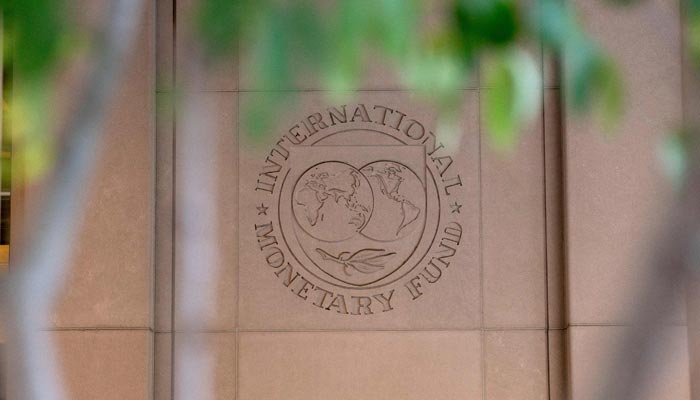IMF likely to club 9th, 10th reviews, seeks clarification on budgetary numbers
Official says so far, no agreement on budgetary numbers and chances are quite bleak to getting IMF's endorsement
June 06, 2023

- IMF demands more clarifications on budgetary framework for FY24.
- IMF has asked to increase FBR’s revenue target by close to Rs10tr.
- Budget Strategy Paper has not yet been approved by federal cabinet.
ISLAMABAD: With only a few days left before the expiry of the current $6.5 billion Extended Fund Facility (EFF) bailout programme, the International Monetary Fund (IMF) has hinted at clubbing 9th and 10th reviews, The News reported Tuesday.
Pakistan and IMF have been negotiating under the ninth review since November and both sides have so far failed to strike a broader agreement on budgetary numbers for the upcoming budget.
In a bid to break the deadlock for the revival of the stalled programme which is going to expire on June 30 this year, both sides held a virtual round of parleys on Monday evening.
The IMF demanded more clarifications on the budgetary framework for 2023-24 as well as for revised estimates for the outgoing fiscal year 2022-23, arguing that fiscal sustainability would remain risky under the increased budget deficit.
“It’s the wish of the Pakistani side to sign a staff-level agreement for completion of the ninth review as a standalone but the IMF has indicated to club ninth and tenth reviews.
"So far, both the sides could not strike a broader agreement on the budgetary numbers and chances are quite bleak to get the endorsement of the IMF on such proposed expansionary budget for 2023-24,” top official sources told The News.
From the Pakistani side, the parleys were attended by Minister of State for Finance Dr Aisha Ghaus Pasha, SAPM on Finance Tariq Bajwa, SAPM on Revenues Tariq Pasha, the finance secretary, special secretary, and other top officials. Finance Minister Ishaq Dar did not attend the meeting.
An official said that it was the first virtual meeting after sharing the budgetary framework for 2023-24 and revised estimates for 2022-23 on which the IMF sought different clarifications during the last week.
“As of today [Monday], they don’t seem to have any major objections,” he said. However, the official did not jump to a conclusion when inquired whether the broader agreement on the budgetary framework was struck or not yet.
No officials of the government were ready to reveal anything on the record as this scribe sent out messages to all top officials but got no official response till the filing of the report.
The IMF side is still not satisfied with the budgetary framework for the next financial year and they are projecting that the budget deficit might exceed further in the wake of a low revenue base and rigid expenditure fronts, so Islamabad will have to undertake major reforms on both fronts to bring the budget aligned with the Fund’s prescriptions.
The government has envisaged fetching Rs9.2 trillion Federal Board of Revenue's (FBR) tax collection target but the IMF is pitching the number on the higher side keeping in view higher nominal growth projections coupled with pressing more on additional taxation measures.
On taxation measures, the IMF did raise objections over the quality and sustainability of the taxation measures. “The qualitative taxation measures can help mobilisation of revenues instead of any patchwork,” said the official sources.
In totality, the IMF has asked the government to increase the FBR’s tax revenue target by close to Rs10 trillion for the next budget, the official said, adding that the FBR high-ups argued it would not be possible for them to jack up the collection from Rs7 trillion to Rs9.8 or Rs10 trillion just in one go.
On the other hand, the government is making plans for targeted subsidies on essential food items, increasing allocation for Ehsas and BISP programmes and unveiling small loans and laptop schemes at subsidised rates in the upcoming budget.
Although the Budget Strategy Paper (BSP) for the next fiscal year has not yet been approved by the federal cabinet the initial estimates of the budgetary framework envisage that the size of the budget will be hovering around Rs13.8 trillion for 2023-24.
The FBR’s revenue target has been envisaged at Rs9.2 trillion but the IMF is pitching upward numbers for the next budget. The debt servicing is all set to consume Rs7.6 trillion. On non-tax revenue target, the SBP profit is envisaged at Rs900 billion, Petroleum Development Levy of Rs750 billion for the next budget.
The National Economic Council (NEC) is scheduled to meet under Prime Minister Shehbaz Sharif on Tuesday (today) to approve the annual development outlay of Rs1.1 trillion as a federal Public Sector Development Programme and Rs1.559 trillion for the four provinces.
The NEC will also approve the macroeconomic framework for the next budget with a real GDP growth rate of 3.5% and an inflation target of 21%.
The sources said that the IMF was also projecting the CPI-based inflation on the higher side but no number was yet firmed up.











